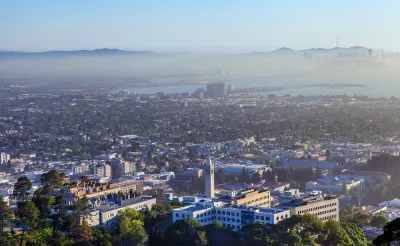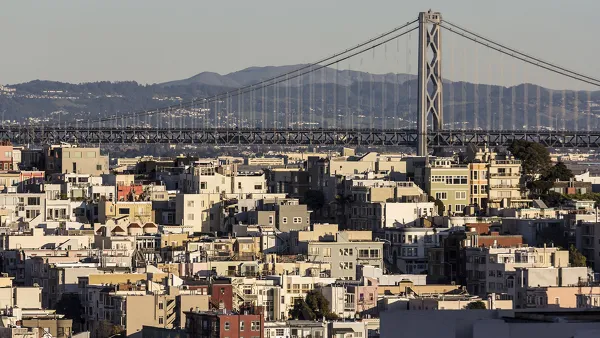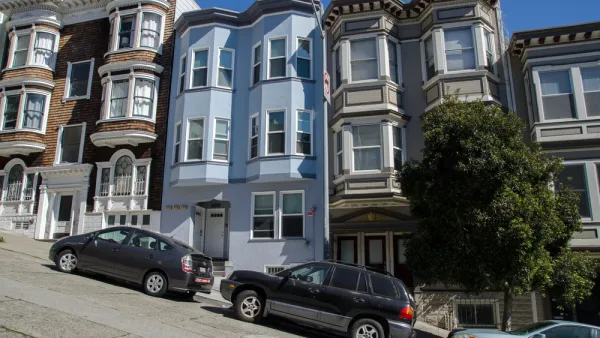One person’s return to the San Francisco Bay Area meant facing the dystopian realities of the rental market.

Living in the San Francisco Bay Area is not cheap or easy, says Wes Enzinna, in a first-person account of his own housing struggles and the drastic changes that had ensued in the 10 years since he had lived there last. He could not even find housing when he moved back to Oakland for a full-time job as an editor. He finally lands a shack, an unfinished tiny-house experiment in someone’s backyard:
There was no plumbing or running water to wash my hands or brush my teeth before sleep. Electricity came from an extension cord that snaked through a yard of coyote mint and monkey flower and up into a hole I’d drilled in my floorboards. The structure was smaller than a cell at San Quentin—a tiny house or a huge coffin, depending on how you looked at it—four by eight and ten feet tall, so cramped it fit little but a mattress, my suit jackets and ties, a space heater, some novels, and the mason jar I peed in.
He was living in West Oakland, an area with seedy motels, liquor stores, and rundown houses, but where homes were still selling for over $1 million to the continuing stream of high-income tech workers. He describes an extreme contrast of wealth and poverty, privilege and hopelessness: residents driving their Teslas from their fortified residential compounds and others hunkering down nearby in tent cities under the freeway.
Enzinna explores the issue of the widespread lack of affordable housing in the Bay Area and in much of California through his own experience—he later moves to a studio in San Francisco’s Telegraph Hill neighborhood—as well as that of people in his life. He was living in Oakland when a fire at the Ghost Ship, an artist collective, killed 36 people, and the aftermath of that tragedy put housing even more out of reach for the area’s most vulnerable residents:
In the year following the Ghost Ship fire, the nonprofit Safer D.I.Y. Spaces estimated that the city’s investigations of similar buildings led to the eviction of about eighty people—that many more added to the swelling population of homeless and displaced. Meanwhile, Oakland mayor Libby Schaaf exploited the tragedy by supporting laws streamlining the development process of condo projects, cynically claiming that they were a solution to the crisis exemplified by Ghost Ship because they created more housing—never mind that these condos were far out of reach of the bohemians who lived in places like Ghost Ship, much less the even more desperate folks, the truly impoverished, on the streets and in the tent cities.
Enzinna eventually heads back to New York, unable to keep up with the rent and increasingly unwilling to tolerate the façade that maintained a world of haves and have-nots in San Francisco. "In my case, I was finally forced back to reality by my credit-card debt: in less than six months in North Beach, I racked up $12,000 in charges trying to cover my bills and rent. The people of San Francisco weren’t happy. They were insane."
FULL STORY: Gimme Shelter

Analysis: Cybertruck Fatality Rate Far Exceeds That of Ford Pinto
The Tesla Cybertruck was recalled seven times last year.

National Parks Layoffs Will Cause Communities to Lose Billions
Thousands of essential park workers were laid off this week, just before the busy spring break season.

Retro-silient?: America’s First “Eco-burb,” The Woodlands Turns 50
A master-planned community north of Houston offers lessons on green infrastructure and resilient design, but falls short of its founder’s lofty affordability and walkability goals.

Test News Post 1
This is a summary

Analysis: Cybertruck Fatality Rate Far Exceeds That of Ford Pinto
The Tesla Cybertruck was recalled seven times last year.

Test News Headline 46
Test for the image on the front page.
Urban Design for Planners 1: Software Tools
This six-course series explores essential urban design concepts using open source software and equips planners with the tools they need to participate fully in the urban design process.
Planning for Universal Design
Learn the tools for implementing Universal Design in planning regulations.
EMC Planning Group, Inc.
Planetizen
Planetizen
Mpact (formerly Rail~Volution)
Great Falls Development Authority, Inc.
HUDs Office of Policy Development and Research
NYU Wagner Graduate School of Public Service



























